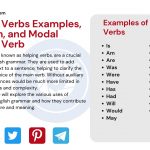Helping Verbs: Meaning, Types, and Examples
Verbs play a vital role in sentence construction, expressing actions, states, or occurrences. Among them, helping verbs, also known as auxiliary verbs, assist main verbs in conveying more precise meanings and verb tenses. Understanding helping verbs and their various types is essential for constructing grammatically correct and meaningful sentences. In this blog, we will explore the meaning, types, and examples of helping verbs to enhance your grasp of English grammar.
What are Helping Verbs?
Helping verbs, also known as auxiliary verbs, are verbs that are used with main verbs to form different tenses, moods, and voices. They do not have a meaning of their own, but they help to express the meaning of the main verb.
Types of Helping Verbs:
There are three primary types of helping verbs in English:
- Primary Helping Verbs: These verbs can function independently as the main verb in a sentence. The primary helping verbs in English are “be,” “have,” and “do.”
- “Be” (am, is, are, was, were, being, been): Used to indicate a state of being, continuous tense, or passive voice.
- “Have” (has, have, had): Used to form perfect tenses.
- “Do” (does, do, did): Used in questions, negations, and emphasis.
- Modal Helping Verbs: Modal verbs express possibility, necessity, permission, or ability. They include “can,” “could,” “may,” “might,” “shall,” “should,” “will,” “would,” “must,” and “ought to.”
- Semi-Modal Helping Verbs: Semi-modal verbs share characteristics of both primary and modal verbs. Common semi-modal verbs are “need to,” “used to,” “dare to,” “have to,” and “ought to.”
Examples of helping verbs
Here are some examples of helping verbs:
- Modal verbs:
- I can swim.
- She could have won the race.
- We may go to the movies tonight.
- They might be late.
- You must study for the test.
- We shall return the book tomorrow.
- I should have told you sooner.
- They would have helped if they had known.
- Be verbs:
- I am a student.
- She is beautiful.
- We are going to the park.
- They were at the party last night.
- I have been working on this project for hours.
- She was being silly.
- Do verbs:
- Do you like chocolate?
- She does not like to cook.
- We did not go to the game.
- They did not know what to do.
- Did you see the new movie?
- She did not say anything.

How to use helping verbs
Helping verbs are used with main verbs to form different tenses, moods, and voices. For example, the helping verb “can” is used to form the present tense of the modal verb “can.” The helping verb “is” is used to form the present tense of the be verb “is.” The helping verb “do” is used to form the present tense of the do verb “do.”
Helping verbs can also be used to form negatives and questions. For example, the negative form of the verb “can” is “cannot.” The question form of the verb “is” is “is she?” The question form of the verb “do” is “do you?”
Examples of helping verbs in sentences
- She is reading an exciting novel. (Primary helping verb – “is”)
- They have finished their homework. (Primary helping verb – “have”)
- Do you like chocolate? (Primary helping verb – “do”)
- He can play the guitar very well. (Modal helping verb – “can”)
- We will visit our grandparents tomorrow. (Modal helping verb – “will”)
- Should I bring a gift to the party? (Modal helping verb – “should”)
- The students need to submit their projects by Friday. (Semi-modal helping verb – “need to”)
- She used to play the piano when she was younger. (Semi-modal helping verb – “used to”)
Helping verbs are an important part of the English language. They are used to form different tenses, moods, and voices, and they can also be used to form negatives and questions. By understanding how helping verbs work, you can improve your grammar and writing skills.





